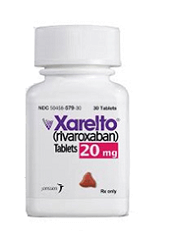
The US Food and Drug Administration (FDA) is investigating issues surrounding a defect in the device that was used to test international normalized ratios (INRs) in the ROCKET AF trial.
ROCKET AF was used to support approval for the direct oral anticoagulant rivaroxaban (Xarelto) in the US and European Union.
According to a legal brief filed in federal court earlier this week, the FDA has asked rivaroxaban’s manufacturer, Johnson & Johnson, if there was evidence of the defect in the INR-measuring device while ROCKET AF was underway.
The trial was a comparison of rivaroxaban and warfarin in patients with nonvalvular atrial fibrillation.
Results suggested rivaroxaban was noninferior to warfarin for preventing stroke or systemic embolism. And there was no significant difference between the treatment arms with regard to major or nonmajor clinically relevant bleeding.
However, an article recently published in The BMJ questioned these results because the Alere INRatio Monitor System (INRatio Monitor or INRatio2 Monitor and INRatio Test Strips), which was used to measure patients’ INRs during the trial, was recalled in December 2014 after giving falsely low test results.
The article suggested the system could have provided falsely low INR values in some patients in the warfarin arm. The lower values could have led investigators to give incorrect doses of warfarin, increasing the risk of bleeding for those patients and therefore giving a false impression of the comparative safety of rivaroxaban.
Two days after The BMJ article was published, the European Medicines Agency released a statement saying the defect with the INRatio system does not change the overall conclusions of ROCKET AF.
Researchers at the Duke Clinical Research Institute, which oversaw ROCKET AF, also assessed the impact of the INRatio defect. Their findings, published in NEJM, suggested the defect did not affect the trial’s outcome.
However, it appears the FDA still has some concerns. The agency has asked Johnson & Johnson whether there was evidence of the INRatio defect during ROCKET AF, according to a legal brief filed by lawyers representing individuals claiming injuries resulting from rivaroxaban.
The brief also cited internal emails that, according to the lawyers, showed some ROCKET AF investigators questioned the accuracy of the INRatio system during the trial. In fact, the lawyers said a special program was set up to investigate the malfunctions, but Johnson & Johnson never disclosed this information to the FDA.


